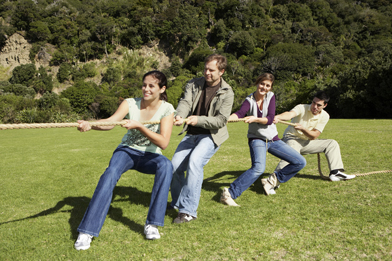Strategies for Effective Teamwork

Paul Sutherland/Photodisc/Thinkstock
Perhaps you’ve experienced problems working in a group or playing a team sport. In your future job, you may be required to work with a variety of people—clients, customers, and colleagues. How can you be a successful member of the team? What strategies can you use to help the team work effectively together?
Each group member brings a unique blend of skills, interests, and personality traits to the group. Understanding group dynamics will help you understand your own behaviour in a group situation as well as the behaviour of others. Think about the types of people that you may see in a group.
Naturally, people won’t always fit neatly into these categories. They may have most of the qualities of one category, but have some qualities from one or more other categories as well. Into which category or categories would you place yourself? Why?
- Explain how each behavioural type in the “types of people” chart can make a group effective or ineffective.
Portfolio Item 1B
Write a script for a short play showing an ineffective group in action. Have your main characters display the attitudes and behaviours that ruin a group’s performance. Your play could be serious, but you might enjoy creating a comedy. Give your play an appropriate title.
Working successfully in any group requires the effective use of a variety of interpersonal, collaborative, and communication skills as well as positive commitment toward achieving the group goal.
Interpersonal Skills |
When you work in a group, you need to be able to
|
Collaborative Skills |
When you work in a group, you should
|
Communication Skills |
When you work in a group, you may need to
|
Everyone needs to participate actively to make a group function effectively. In some groups, you may be asked to perform specific roles, such as a reporter, secretary, or chairperson.
- Explain how you would use interpersonal, collaborative, and communication skills in each of the following roles:
- the secretary or recorder
- the treasurer
- the reporter or spokesperson
- Perhaps the most demanding role in any group is that of the chairperson or organizer.
- List the duties that a chairperson or organizer might be expected to perform.
- What skills does this role require?